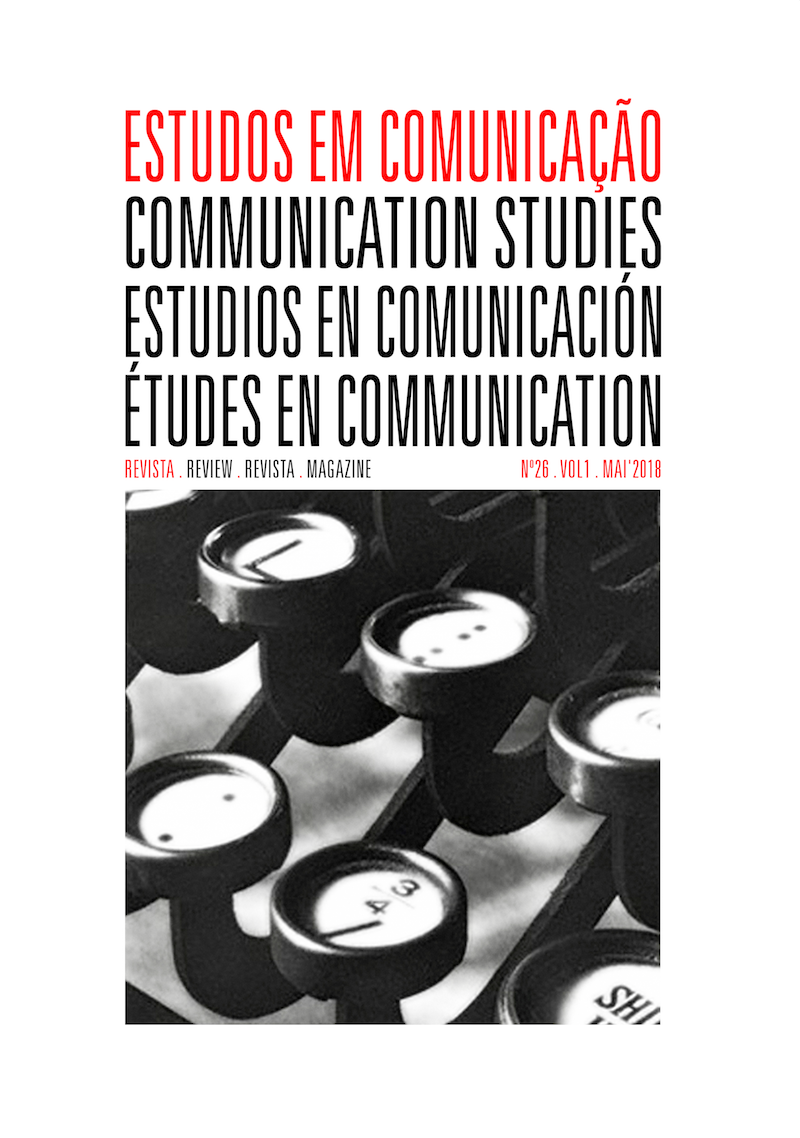Young people and their practices of access and consumption of news in social media
Keywords:
young people, current events, social mediaAbstract
The transformations in the media landscape and their implications for the use of the media by the younger generations have been the object of study of several researches. Studies on this problematic document that young people are apathetic and have lack of interest in the "serious"issues of society and the world, such as lack of motivation to follow up on these issues. Assuming this theoretical framework, this paper aims to understand the ways of appropriation that young adults do social media and how these can be as means for monitoring current events, the development of media literacy and civic participation. From the methodological point of view, this research involved the development of four focus groups among 24 university students from the Coimbra and Lisbon areas, from different family and social contexts. The main conclusions reveal a passive and almost exclusive consumption of online information, scepticism and disbelief in relation to traditional media, distrust of digital media, generalization of the idea of "fake news", very reduced civic engagement and disbelief in the relevance of active participation, and perception that younger people are not audiences of the news.
References
Alon-Tirosh, M. & Lemish, D. (2014). “If i was making the news”: what do children want from news?. Participations – Journal of Audience & Reception Studies, 11(1), 108-128.
Barber, T. (2009). Participation, citizenship, and well-being: engaging with young people, making a difference. Young – Nordic Journal of Youth Research, 17(1), 25-40.
Brites, M. J. (2010). Jovens (15-18 anos) e informação noticiosa: a importância dos capitais cultural e tecnológico. Estudos em Comunicação, (8), 169-192.
Brites, M. J. (2015). Jovens e culturas cívicas: por entre formas de consumo noticioso e de participação. Covilhã: Labcom.IFP.
Buckingham, D. (2000). The making of citizens: young people, news and politics. London: Routledge.
Buckingham, D. (2005). Educación en medios: alfabetización, aprendizaje y cultura contemporánea. Barcelona: Paidós (edição original inglesa de 2003).
Cara, J. C. G. & Tornero, J. M. P. (2010). La alfabetización mediática y la lei general de comunicación audiovisual en España. Barcelona: Editorial UOC.
Carpentier, N. (2011). Media and participation: a site of ideological-democratic struggle. Intel- lect Ltd.
Carter, C.; Davies, M. M.; Allan, S. & Mendes, K. (2009). What do children want from BBC? Children‘s content and participatory environments in an age of citizen media. Cardiif: The Cardiff School of Journalism. Disponível em: www.bbc.co.uk/blogs/legacy/knowledgeexchange /cardifftwo.pdf (acedido em 14 de maio de 2014).
Couldry, N. & Markham, T. (2006). Public connection through media consumption: between oversocialization and de-socialization?. The ANNALS of the American Academy of Political and Social Science, 608(1), 251-269.
Dalghren, P. (2002). Children in swedish news. News From ICCVOS, 6, 1, 6.
Dahlgren, P. (2009). Media and political engagement. Cambridge: Cambridge University Press.
Delorme, M. I .C. (2013). As crianças e as notícias da televisão. Educação em Revista, 29(1), 205-223.
ERC (2016). As novas dinâmicas do consumo audiovisual em Portugal. Disponível em: www.erc. pt/documentos/Estudos/ConsumoAVemPT/index.html. (acedido em 19 de maio de 2017)
Jenkins, H.; Clinton, K.; Purushotma, R.; Robinson, A. J. & Weigel, M. (2009). Confronting the challenges of participatory culture: media education for the 21st Century. MacArthur Foundation. Massachusetts Institute of Technology. Disponível em: https://mitpress.mit.edu/sites /default/files/titles/free_download/9780262513623_Confronting_the_Challenges.pdf (acedi- do em 7 de maio de 2015).
Livingstone, S.; Couldry, N. & Markham, T. (2007). Youthful steps towards civic participation: does the internet help?. In B. Loader (ed.), Young citizens in the digital age: political engagement, young people and new media (pp. 21-34). London: Routledge.
McQuail, D. (2003). Teoria da comunicação de massas. Lisboa: Fundação Calouste Gulbenkian.
Mihaidilis, P. (2011). New civic voices & the emerging media literacy landscape. Journal of Media Literacy Education, 3(1), 4-5.
Olson, D. & Rampaul, G. (2013). Representations of Childhood in the Media. In D. Lemish (ed.), The Routledge International Handbook of children, adolescents and media (pp. 23- 30). London & New York: Routledge.
Ponte, C. & Afonso, B. (2009). Crianças e jovens em notícia – análise da cobertura jornalística em 2005. In C. Ponte (org.), Crianças e jovens em notícia (pp.29-46). Lisboa: Livros Horizonte.
Ponte, C. (2011). Uma geração digital? A influência familiar na experiência mediática de adolescentes. Sociologia, Problemas e Práticas, (65), 31-50.
Prensky, M. (2001). Digital natives, digital immigrants part 1. On the horizon, 9(5), 1-6.
Reese, S. (2012). Global news literacy. In P. Mihaidilis (ed.), News literacy: global perspectives for the newsroom and the classroom (pp.63-80). New York: Peter Lang.
Third, A.; Bellerose, D.; Dawkins, U.; Keltie, E. & Pihl, K. (2014). Children‘s Rights in the Digital Age: A Download from Children Around the World. YOUNGANDWELL. Unicef.
Downloads
Published
Issue
Section
License
Estudos em Comunicação/Communication Studies is an Open Access journal. All its content is freely available without charge to the user or his institution. Users are allowed to read, download, copy, distribute, print, search, or link to the full texts of the articles in this journal without asking prior permission from the publisher or the author. Estudos em Comunicação, by Labcom, is licensed under a Creative Commons Atribuição-NãoComercial-SemDerivações 3.0 Unported License. By submitting your work to Estudos em Comunicação/Communication studies you confirm you are the author and own the copyright, that the content is original and previously unpublished, and that you agree to the licensing terms.


